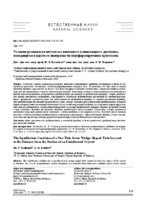| dc.contributor.author | Василевич, Ю. В. | |
| dc.contributor.author | Остриков, О. М. | |
| dc.coverage.spatial | Минск | ru |
| dc.date.accessioned | 2019-01-02T11:32:18Z | |
| dc.date.available | 2019-01-02T11:32:18Z | |
| dc.date.issued | 2018 | |
| dc.identifier.citation | Василевич, Ю. В. Условие равновесия нетонкого винтового клиновидного двойника, находящегося вдали от поверхности недеформируемого кристалла = The Equilibrium Condition of a Non-Thin Screw Wedge-Shaped Twin Located in the Distance from the Surface of an Undeformed Crystal / Ю. В. Василевич, О. М. Остриков // Наука и техника. – 2018. – №6. – С. 515-520. | ru |
| dc.identifier.uri | https://rep.bntu.by/handle/data/48417 | |
| dc.description.abstract | Получено условие равновесия нетонкого винтового клиновидного двойника, находящегося вдали от поверхности кристалла. Рассмотрен случай недеформируемого твердого тела. Установлено, что при таких условиях винтовой двойник существовать не может. Результат находится в полном соответствии с общеизвестными результатами для дислокационных стенок из винтовых дислокаций. В методике вывода условия равновесия использовалось приближение непрерывного распределения двойникующих дислокаций на двойниковых границах. Форма двойниковых границ описывалась функциями, зависящими от плотности двойникующих дислокаций на двойниковых границах. Принималось равенство нулю сил, действующих на двойниковые границы со стороны дислокаций двойника. Для двойникующих дислокаций предполагалась одна степень свободы вдоль направления двойникования. В модели эффекты переползания дислокаций исключены. Расчет полей напряжений двойника велся в рамках теории упругости. При этом рассматривалась суперпозиция напряжений от каждой двойниковой границы. Решение уравнений искали в виде полинома. Детально рассмотрено линейное приближение такого решения. Полученное условие равновесия выполняется при двух равных нулю значениях – длины двойника и его ширины у устья. Результат имеет большое значение в области механики двойникующихся материалов, материалов с эффектом памяти формы, а также в разработке методик прогнозирования разрушения и функционирования двойникующихся материалов. | ru |
| dc.language.iso | ru | ru |
| dc.publisher | БНТУ | ru |
| dc.title | Условие равновесия нетонкого винтового клиновидного двойника, находящегося вдали от поверхности недеформируемого кристалла | ru |
| dc.title.alternative | The Equilibrium Condition of a Non-Thin Screw Wedge-Shaped Twin Located in the Distance from the Surface of an Undeformed Crystal | ru |
| dc.type | Article | ru |
| dc.identifier.doi | 10.21122/2227-1031-2018-17-6-515-520 | |
| local.description.annotation | The equilibrium condition for a non-thin helical wedge-shaped twin located far from the surface of the crystal is obtained. The case of an undeformed solid is considered. It is established that under such conditions a helical twin can not twin can not exist under such conditions. The result is in full conformity with generally known results for dislocation walls from helical dislocations. An approximation for continuous distribution of twinning dislocations at twin boundaries has been used in methodology for deriving an equilibrium condition. The shape of the twin boundaries has been described by functions that depend on density of the twinning dislocations at the twin boundaries. It has been assumed that the forces acting on the twin boundaries from the side of the twin dislocations are equal to zero. One degree of freedom along a twinning direction has been presupposed for twinning dislocations. Dislocation creeping effects have been excluded in the model. A calculation of stress fields for a twin has been carried out within the framework of an elasticity theory. In this case a superposition of stresses from each twin boundary has been considered. The solution of equations has been sought in the form of a polynomial. A linear approximation of such solution is considered in detail. The ем resulting equilibrium condition is satisfied for two values equal to zero that is a twin length and its width at the mouth. The result is important in the field of mechanics for twinning materials, shape memory materials, and in the development of techniques for predicting destruction and functioning of twinning materials. | ru |

